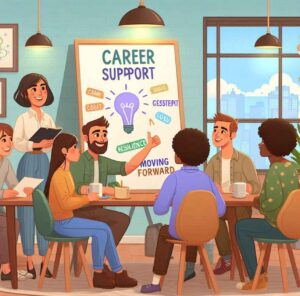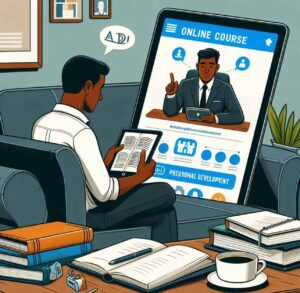Welcome Blessings!
(Tap 🔽 to see more topics!)


Job interview rejection recovery isn’t about pretending it doesn’t sting. It’s about knowing that ‘thanks, but no thanks’ email, the one that hits you right in the gut after you thought you nailed it. Suddenly, your confidence takes a nosedive, and you start questioning everything. But a hard truth is served straight up… getting turned down after a job interview? It’s not a career death sentence. It’s often the push you need to find something way better.
You know, it’s a lot like dating. You go out, think it’s going great, and then… nothing. You don’t let one bad date derail your entire love life. Your career’s the same deal. Sometimes, the universe is just giving you a gentle nudge, saying, ‘Not this one; something awesome is waiting.’ If you look at the stories of people who’ve made it, you’ll see a pattern: rejection isn’t a stop sign; it’s a stepping stone.
Instead of letting that rejection email fester, let’s flip the script. Let’s turn that ‘no’ into a ‘heck yes’ to your future. How do you do that? Well, I’ve got seven solid steps to help you dust yourself off, learn from the experience, and return more potent than ever!
Good thing? Seriously?’ But hear me out. It’s easy to see rejection as a straight-up loss, a sign you weren’t good enough. But what if we flipped that script? Getting turned down could be a win in disguise.
We often hear the saying, ‘Sometimes good things fall apart, so better things can fall together,’ while it might seem a bit cliché, its application to job rejections is surprisingly relevant. It’s perfectly understandable to feel discouraged after an interview rejection. However, consider the possibility that this setback is a redirection, steering you toward a more aligned opportunity. Instead of framing rejection as a personal failure, view it as a course correction.
In essence, while rejection may be disheartening, it’s vital to recognize its potential as a catalyst for growth and future success.

It’s important to remember, and this is a key point, that you’re not alone in experiencing job interview rejection. Oprah Winfrey wisely noted, ‘I do not believe in failure. It is not a failure if you enjoy the process.’ This perspective is particularly relevant here. Rejection is a remarkably common experience in the job search context. A recent survey indicated that approximately 75% of job seekers who applied for positions within the past year did not receive an offer. This statistic underscores the universality of this challenge.
Furthermore, it’s worth noting that many highly successful individuals encountered significant setbacks on their path to achievement. It’s not just you. The statistics show that job rejection is a prevalent issue.
These examples illustrate that rejection is not a definitive endpoint but rather a potential stepping stone. Recognizing that this experience is shared and that even notable figures have experienced similar challenges can provide a sense of perspective and encouragement.
Winston Churchill once said, ‘Success is not final; failure is not fatal: it is the courage to continue that counts.’ And honestly, that’s spot on. Every interview, even the ones that don’t land you the job, is a chance to learn and grow. Instead of letting rejection define you, consider it free feedback—a straightforward way to determine what you can improve.
By asking these questions, you’re not dwelling on the ‘failure’ but actively gathering insights. It’s about taking that rejection and turning it into a roadmap for your following interview. That way, you’re not just moving forward; you’re moving forward more innovative.
You know that saying from Alexander Graham Bell, ‘When one door closes, another opens, but we often look so long and so regretfully upon the closed door that we do not see the one which has opened for us’? It’s a classic, but it has a real point, especially when dealing with job rejections. Sometimes, that ‘thanks, but…’ is a gentle nudge to look around and see what else is out there. It’s easy to get fixated on the job you didn’t get, but what if it was a sign that it wasn’t the right job for you?
Instead of getting stuck on the closed door, let’s use this to see what other doors are swinging open. You might find something amazing waiting for you.
‘The only person you are destined to become is the person you decide to be,’– Ralph Waldo Emerson. Look, getting turned down? It’s rough. But it builds character. It teaches you to bounce back, to be patient, and to adapt. And those skills? They’re gold, not just in your career but in life.
How you handle these setbacks is a preview of how you’ll handle future wins. A positive attitude isn’t just fluffy talk… it’s a real advantage.
It’s easy to want to pull the covers over your head after a rejection, but that’s the last thing you should do. As Confucius wisely said, ‘Our greatest glory is not in never falling, but in rising every time we fall.’ That’s the real deal. Persistence, put, is your superpower here. A rejection isn’t a life sentence to unemployment. It’s just a sign that you’re on the journey and need to keep moving forward.
Keep your chin up, keep applying, and keep getting better. That’s how you turn those ‘no’s’ into ‘yes’s.’
What if you turned your experience into something that helps others? Arleen Lorrance said, ‘One way to start a preventative program is to be the change you want to see happen.’ In this context, that ‘change’ could be sharing your story. That rejection can be a powerful way to inspire others. Think about your journey, your resilience after getting turned down, could be the boost someone else needs when they’re feeling low.
Consider sharing your story. It’s a way to turn something negative into a positive force, both for yourself and those around you.

Step 1: Practice Positive Affirmations
It might sound a little ‘woo-woo,’ but trust me, it works: positive affirmations. Think of it as a little mental pep talk you give yourself daily. We know how much a job rejection can shake your confidence. That’s why starting your day with a bit of self-belief can make a huge difference. It’s not about being delusional; it’s about reminding yourself of your strengths.
It isn’t about some magic spell. It’s about shifting your mindset. When you start your day with positive affirmations, you’re more likely to approach challenges confidently and motivated. It’s like training your brain to see the opportunities instead of the roadblocks.
Step 2: Connect With Others
It’s easy to feel like you’re the only one ever getting a rejection email. But that’s just not true. Loads of people have been in your shoes, and they’ve survived and thrived. So, how do you find them?
Don’t isolate yourself. Talking to others who’ve walked this path can be incredibly reassuring and super inspiring. You’ll hear stories that make you think, ‘Okay, I got this.’
Step 3: Ask for Feedback
After you get that ‘thanks, but no thanks’ email, it’s easy to bury your head in the sand. But here’s the thing: turn that ‘no’ into a learning experience. Don’t hesitate to contact the interviewer and politely ask for constructive feedback. Not every recruiter will have the time or be able to share specifics, but you might be surprised. Some are willing to give you some pointers on areas you can improve.
Don’t be afraid to ask. You’ve got nothing to lose and everything to gain.
Step 4: Expand Your Job Search
Feeling a little boxed in after an interview rejection is natural. But the thing is now’s the perfect time to explore beyond your usual job search. Think of it as opening up a new map. You may have been focusing on one specific route, but many other roads exist to explore. Expand that job search.
Think of this as a chance to discover possibilities you didn’t even know existed. You might stumble upon something extraordinary.
Step 5: Upgrade Your Skills
Step 5 is all about leveling up – your skill set precisely. Think of it like you’ve got this window of time, a chance to become even more valuable to future employers. Instead of letting the rejection hold you back, use it as fuel to become the candidate they can’t ignore.
Essentially, this is about using the setback as a springboard. Turn this moment into an opportunity to become the most skilled version of yourself.
Step 6: Set a Job Search Routine
Alright, so we’ve covered the mindset and the learning part. Let’s talk about keeping the ball rolling – setting up a solid job search routine. It isn’t about turning your life into a rigid schedule; it’s about building a framework that keeps you focused and productive. Think of it like, you wouldn’t train for a marathon without a plan, right? Your job search is the same. It’s a process, and a consistent approach makes a huge difference.
A job search routine is your roadmap. It keeps you moving forward, helps you stay organized, and ultimately increases your chances of landing that perfect role.
Step 7: Share Your Journey
Finally, let’s discuss sharing your experience. We’ve covered processing your emotions and learning from the rejection, but there’s power in sharing your journey with others. It might seem counterintuitive, especially if you’re feeling raw, but connecting with others going through similar experiences can be incredibly beneficial.
Sharing your journey isn’t just about helping others but also reinforcing your resilience. By articulating what you’ve learned, you solidify those lessons for yourself and create a supportive community. It’s a win-win.

Look, let’s be honest… job interview rejections? They’re never fun. It’s like a little punch in the gut. But your career? It’s not a sprint, it’s a marathon. It’s full of those little bumps in the road, those ‘oops’ moments. But every ‘oops’ is just a ‘hey, learn from this’ moment. Every time you get a ‘no,’ you’re one step closer to a ‘yes.’ You’re refining your skills, figuring out your wants, and getting stronger. Your career’s a journey, not a ‘get there and stop’ thing. It’s about growing, changing, and finding your path.
Keep your chin up! Keep learning, pushing, and, most importantly, believing in yourself. Is that a perfect fit? It’s out there, waiting for you. Honestly, all these ‘no’s’ are just getting you ready for that big ‘yes.’ Voila! Until next time!